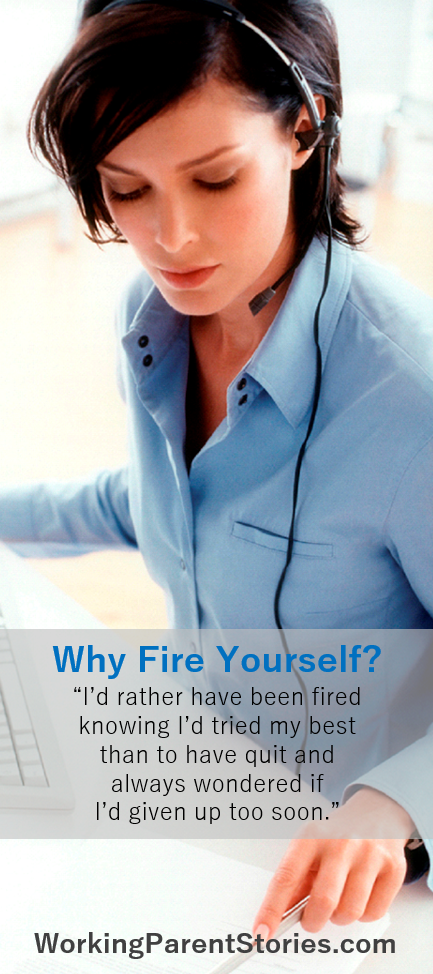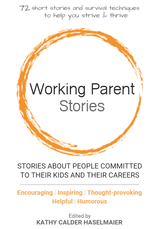|
Submitted by Kathy Haselmaier - "Employers need to find ways to neutralize and overcome the effects of How employers can improve employee retention among working parentsAs the editor of Working Parent Stories, you probably won’t be surprised to read that I’ve gotten to know a lot of working parents … and their stories. A common theme has emerged within many of the stories that is rarely discussed. We’re used to hearing about the need for better benefits and more flexibility within the workplace as a way of enticing more women to remain in the workforce, and most agree that these things are valued by all working parents and probably most employees. But something mentioned less often, and a theme that is emerging in many working parent stories, is that subtle messages are being sent to working mothers that can affect their determination to purse their careers and maintain the energy needed to succeed. The messages are sent by friends, relatives, and the media. They question a woman’s commitment to her family when she chooses to pursue a career. I call these messages “micro discouragements”. Every woman knows that if she has a child she will need to make “the choice”; will she return to work or exit the workforce after the baby arrives? Sometimes the choice is made with a partner. And sometimes there is no choice because returning to work is a necessity. Most men aren’t yet expected to make “the choice”. But as more and more women out-earn their partners, more and more men are finding they need to make “the choice” too. Recently I heard someone comment that working mothers often manage their careers like their fathers (who often had full-time "assistants" at home) while trying to mother like their stay-at-home moms. And some working fathers have few, if any, role models from dual-career couples. Some people dismiss these generalizations as outdated, but stories from young working parents suggest that the struggle is still very real for many of them. Even today. If you’re a man balancing fatherhood with a demanding career that requires hard work every day, every week, and every month, imagine the joy of a holiday gathering with family (which, of course, involves more and different work at home). And then imagine the feeling you’ll get when your father quietly asks you, “How’s work going? How sure are you that pursuing your career is really best? Isn't Kelsey's career going well enough to enable you to be home for the kids?” Could it feel a little like a punch in the gut? A “micro discouragement”? Could a steady stream of these messages start to undermine your enthusiasm, resolve, and energy? Many women who have careers are enduring these micro discouragements on a regular basis. Even today. They come from their parents, friends, aunts and uncles, the Internet, other parents, TV, cousins, magazines, people at church, and the radio. More and more men may start to endure them too. Some women let them roll off their backs and never give them a second thought. Some women are energized by them because they represent a challenge. But some women don’t find these comments energizing at all. These are the women who are at risk of dropping out of the workforce or have already. These are the women who struggle to maintain the energy needed to juggle multiple roles that include a career. These are the women who are often at risk of leaving your company or maybe the workforce entirely. These are the women who can’t fully enjoy the satisfaction of a job well done within the context of a career. So what can employers do? First, it’s probably worth noting that you can’t afford to provide enough benefits to impress “Aunt Susie” or “Tiffany” at the PTA meeting. No matter how much flexibility and assistance you offer your working parents, some of their friends and relatives are likely to continue delivering "micro discouragements", at least for the foreseeable future. So employers need to find ways to neutralize and overcome the effects of the “micro discouragements” with “micro encouragements”. They need to help working parents more clearly recognize the benefits their work provides to their families. The data is out there, and employers need to find ways to get it in front of their employees. They can also pair young working parents with older working parents who’ve mastered the balance. They can share stories of success within their own companies via web sites, videos, and newsletters. They can create forums so that working parents can encourage each other, discuss challenges, and share best practices. Find ways to provide “micro encouragements” to young working parents, and then reap the rewards for years to come.
0 Comments
Pointer to a blog post by Dr. Sandy Fiaschetti - "It was no big political statement or anything controversial ..." Dr. Sandy Fiaschetti, a working mom with five kids, won an award, but she didn't accept it. Read why in her recent blog post.
Submitted by Shannon Mika - "Some friends help us shift our thinking ..."
My husband and I have three boys. The first can legally drink, the second wishes he could, and the third is a decade from it. Not only are the boys spaced across fourteen years, none of us shares the same two biological parents. Our first is a product of my husband's first marriage which ended in divorce. Our second is the product of my first marriage which ended after cancer killed my husband. And our youngest – he was the product of this blended chaos! Like any house, there’s always lots going on under our roof. Oh, and not only am I the Mom of this tribe, the Director of Operations for this household, I work full-time too.
Frequently I find myself talking about motherhood with other moms. And guess what? As different as we all are, we’re not all that different. Through it all – the joy, the heartbreak, the guilt, the laughs, the tears, the fear, the days we’re hanging by a thread – it seems to me that we’re all just doing the best we can! I suspect the dads feel the same way. Even so, I can’t help but feel a little (okay, a lot) guilty about what I do or don’t do. But I’m working on that. A while back, a friend posted something profound on Facebook. She said she's trying to frame life with gratitude instead of guilt. Easier said than done, right? Maybe not. The trick is simple, she’s started replacing her “I’m sorrys” with “Thank yous.” Instead of saying, "I'm sorry I'm late" she says, "Thank you for waiting." Instead of saying "I'm sorry I'm such a mess" she said, "Thank you for accepting me unconditionally." This switch has really stuck with me. And once again, it struck me; we all learn from each other. Some friends help us shift our thinking, some accept us on the "messy" days, and some help us understand that we're all just doing the best we can. And most days, that's good enough.
Pointer to a BuzzFeedVideo by Hannah Williams - "We had some intersting results." This BuzzFeedVideo (8:40 min) from Hannah Williams may have you thinking she's crazy at the beginning, but by the end you may find yourself convinced that she uncovered some valuable lessons you can use (while avoiding the actual "experiment").
Submitted by Jim Haselmaier
My wife and I both worked full-time while raising our two kids. It never occurred to me that I might give up my career after our kids came along. It seemed like everyone I knew expected me to support my family financially, and I never questioned that expectation. Before our daughter was born, my wife told me that she thought she might be a better mother if she continued working, and I agreed with her. So even when things got hectic and stressful (and trust me they did), it never entered my mind to give up my career.
In hindsight, I think the process of managing careers and kids worked for both of us because we were determined to make it work. Most of the time it was just that simple. We also developed a level of flexibility that enabled us to manage and cope with the unexpected demands presented by our kids and our jobs. We got really good at supporting each other and communicating clearly. It's worth pointing out to younger parents that we weren't great at any of this in the beginning. It took years of trial and error, failures and successes, and a lot of laughter (and a few tears) to work into a rhythm. We were lucky to have friends with similar lifestyles who would listen to our stories and laugh (rather than gasp) and then tell their own similar stories. Even though our kids have been on their own for a while now, we still feel like we're catching up on lost sleep and quiet time. We each had standing "household assignments"; mine were cooking, grocery shopping and keeping up with the cars. My wife's focus was laundry, paying bills, and "logistics". Over time I added investing and she took on some volunteer work. We recognized that the demands of our careers ebbed and flowed. When one of us was particularly busy at work, the other might need to step in and do more around the house for a while. The fact that we both had demanding full-time careers made us extra sensitive to situations where work was particularly hectic for the other. It caused us to develop a lot of empathy for each other too. One thing that worked for us was an agreement that we would never commit to a business trip without talking with each other to be sure our trips didn't overlap. That ensured we were always able to honor our commitments. And once my in-laws came to the rescue when we both really did need to travel the same week. One night, while I was out-of-town and having dinner with colleagues, my cell phone rang. My wife was calling to ask about a logistical issue at home. The call was quick and efficient with none of the standard pleasantries. My dinner colleagues (who knew my wife and our dual-career situation) started quizzing me about how we do it - raise kids while both of us work. I told them that we'd developed a high degree of empathy for each other. For example, I told them that we understand that, when traveling, the person at home has the harder job. I pointed out that I didn't tell her I was out having a nice meal in a nice restaurant and enjoying myself because that would not have helped her as she was dealing with the stress at home. I appreciated that my career enabled me to travel and change my focus on occasion. I hope it made me a better parent. My wife's career offered the same benefits for her. Determination, flexibility, and commitment enabled us to make it work. Every day.
Submitted by Maggie We’re called the “sandwich generation.” I’m not sure who coined the expression, but it does seem to work. With advances in medicine, and Medicare covering the costs of that medicine, most people are living longer. This means that our children (the sandwich’s bottom layer) and our elder relatives (the sandwich’s upper layer) become part of the daily juggle for a working parent. How do working parents cope? Two years ago we lost my dad to a sudden heart attack. This left my mother without a full-time caregiver in a community that was built around two golf courses and not designed for someone requiring assistance. Mom had taken a series of falls two years prior to his death, and her injuries, coupled with peripheral neuropathy and arthritis, left her needing a lot of daily care. Her mind is sharp, but dressing, showering, and getting to doctors' offices had been left to my dad. Her daily requests and needs surpass those of a child and leave me wondering how to approach my employer regarding my need to give my mom the attention she needs. Shortly after we moved Mom to an assisted living residence, I was laid off from my job. I wonder if my time away from the office resulted in my layoff. Fortunately I found a work-from-home position with my current employer and have a boss who believes in putting family first. Perhaps the universe helps us when we need it most. Mom is going on her second year in an assisted living facility. The daily requests have diminished thanks to the staff there. And I still have that understanding boss. How do you juggle responsiblities if you are part of the sandwich generation? I'm eager to read your replies.
Submitted by Kathy Haselmaier
Recently I was talking with a young working parent who was at her wits' end. She has two young children and a high pressure career. Her employer would be happy if she worked 24 hours/day. She's thinking about resigning because she just doesn't feel like she can keep up with all of the demands. Oh, and did I mention that her work environment is crazy too? The people, the assignments, and the organization structure aren't making things any easier.
I told her that I had been in similar situations in the past and asked myself this question: would I rather quit in defeat or get fired after trying my hardest? For me, it was the latter. I'd rather have been fired knowing I'd tried my best than to have quit and always wondered if I'd given up too soon. That said, I still needed to find ways to maintain my sanity, so I often defined boundaries for myself at work. For example, I'd tell myself that I would leave the office by a certain time each day, be sure to participate in certain personal activities each day, or limit my hours worked each week. Then I reminded myself that if adhering to any of these boundaries caused me to get fired, I wouldn't beat myself up for it. If I was going to be out of work, it wouldn't be for a lack of trying. Guess what? I never got fired. In fact, I never (and I mean never) had a manager that even seemed to notice a change in my performance. Sometimes I actually did a better job because I was forcing myself to focus on the most important work and work more efficiently. If you're at the point where you're not sure you can take it anymore, it might be time to look for a new job. Or you may be able to modify your existing job, on your own terms and without involving your manager, in a way that makes it feel new and more manageable. Why fire yourself?
Originally Published: Oct 19, 2017 | Last Updated: May 23, 2018
Submitted by Karen Whitefoot My story starts with the fact that I raised twins by myself. Fortunately my career as a nurse provided some flexibility, including the ability to work extra hours so we were able to afford the necessities and a home with a yard. We even went on a couple of vacations. The flexible hours also enabled me to spend time with my kids.
My own mother was home with my siblings and me full-time. I'd never want the quality of the meals I served or the cleanliness of my house to be compared with hers. Her results were impressive. I've definitely been a different kind of mother. Both of my children have incredible work ethics. I think it's at least partly because they watched me working hard. They help pay for their schooling by working on and off campus. They are amazing, productive adults. Raising them has been my greatest accomplishment and seeing them appreciate education, work hard, and volunteer tirelessly while maintaining their grades feels great. The fact that my kids are turning out well leads me to believe that I did something right. Different, but right. Submitted by Kathy Haselmaier The great thing about a long career is that you can look back, pull out a few nice stories that highlight your "shining moments", and share them with others as an example of your experience. Then you can conveniently forget all of the other "stuff" that happened. There is great value in sharing the good stories to be sure. We all learn from each other, and it's better to leverage the good stuff. With that said, when we only share our positive stories, we may leave others with unrealistic ideas about what it takes to manage a career. While talking with a young working parent who was questioning her ability to continue pursuing her career recently, I made a casual reference to "my meltdowns". She stopped the conversation. Then she said, "You had meltdowns?" I had to laugh, because all of my close friends know that I had meltdowns, and boy-oh-boy does my husband know that I had meltdowns. They were most frequent when our kids were little, but I have to admit that they started before we had kids, and they didn't end after the kids left home. It's possible I'd have had even more meltdowns if I didn't pursue a career. By the time I reached my mid-20s, I learned that you don't do anyone any favors when you go on and on about your own shortcomings, so I mostly kept the meltdown stories to myself. But in case others find it at all comforting, let me just say that there were meltdowns. There was whining. There was complaining. And on occasion there was crying. My husband was there and endured it all. It's probably worth mentioning that he also became overwhelmed at times. He handled it differently, but there were times he wasn't sure he could handle it all either. But I had meltdowns more often and better than he did. I definitely "won" meltdowns. (In case you're wondering, we had a string of years when our kids were little when I bet I had a meltdown every quarter. As time went on, I think they may have gone down to a rate of one every five years. It did get better, especially as the kids started taking more and more responsibility for their own activities.) There was problem solving too. And there were a lot of very long conversations and negotiations that occurred between my husband and me about how we could keep going while keeping it all together. It. Was. Not. Easy. But we both wanted to make it work, so we did. It wasn't always pretty, but we crossed the finish line. And we're glad we stayed in the race. P.S. My husband (aka "assistant editor") said that he was disappointed after reading this story. He thought I was going to share a dramatic story about one of my meltdowns, and he thinks other readers may be a bit disappointed with this ending. Sorry about that, but I'm not going there.
Submitted by Mark Haselmaier As a kid, Halloween was obviously a big deal. A costume ritual was involved. I would wear it around the house a couple of times before the big day (to make sure it worked and all), and then be near euphoria when it was finally time to reveal its awesomeness to the world. I always considered myself lucky at Halloween because my parents took me to the store and let me pick out my own costume. Very rarely did we do stuff like that. Usually, if I wanted something, I either had to work around the house to earn enough money to pay for it, or I had to save money from my allowance to purchase what I wanted. But it felt like during Halloween my parents and I were on the same wavelength; this kid needs a costume, and it needs to rock. So it came as a shock when just this past weekend my mother experessed embarrassment because she had to buy me costumes all those years instead of making me something more special. What? You’re embarrassed? Why are you embarrassed about something that totally kicked ass? You let me pick out whatever I wanted from the costume aisle. That was the only time you let me just walk into a store and pick whatever I wanted and then you paid for it. For a Haselmaier child, this was almost unheard of. After further discussion I learned that the purchase of a Halloween costume, instead of the creation of one, saved a lot of time for my working parents. It seems funny to me that they were embarrassed that they resorted to a K-Mart or Walmart aisle at Halloween. For 4-year-old me (and 11-year-old-me for that matter) it was the pinnacle of Halloween fun. Chill out parents. You may be taking things a little too seriously.
|
The StoriesArchives
March 2022
Categories
All
|
Photos from barnimages.com, marcoverch, truewonder, donnierayjones, marcoverch, shixart1985, Gustavo Devito, edenpictures, nan palmero, quapan, The Pumpkin Theory, bark, opassande, Semtrio, Ivan Radic (CC BY 2.0), verchmarco (CC BY 2.0), Didriks, shawnzrossi, shixart1985 (CC BY 2.0), madprime, marksmorton, CT Arzneimittel GmbH, NwongPR, franchiseopportunitiesphotos, anotherlunch.com, jdlasica, wuestenigel, Frinthy, romanboed, Doris Tichelaar, quinn.anya, A_Peach, VisitLakeland, MEDION Pressestelle, Darren Wilkinson, bratislavskysamospravnykraj, Anthony Quintano, Danielle Scott, pockethifi, Bridgette Rehg, Martin Pettitt, PersonalCreations.com, wuestenigel, Thad Zajdowicz, archer10 (Dennis) 139M Views, Infomastern, beltz6, The National Guard, futurestreet, daveynin, OIST (Okinawa Institute of Science and Technology), Rinet IT, shixart1985, mikecogh, JeepersMedia, Ryan Polei | www.ryanpolei.com, Jake.Christopher., aleksandrajovovich, thepeachpeddler, wwward0, flossyflotsam, Got Credit, Senado Federal, Corvair Owner, lookcatalog, moodboardphotography, dejankrsmanovic, Carine fel, ElleFlorio, {Guerrilla Futures | Jason Tester}, greg westfall., Arlington County, mariaronnaluna, quinn.anya, wuestenigel, Tayloright, insatiablemunch, MrJamesBaker, Scorius, Alan Light, Monkey Mash Button, www.audio-luci-store.it, wohlford, Vivian Chen [陳培雯], okchomeseller, BoldContent, Ivan Radic, verchmarco, donnierayjones, Czar Hey, US Department of Education, Andrew Milligan Sumo, Michel Curi, anotherlunch.com, ProFlowers.com, Cultural viewpoints from around the world, alubavin, yourbestdigs, Rod Waddington, Tayloright, Wonder woman0731, yourbestdigs, donald judge, Thomas Leth-Olsen, Infinity Studio, shixart1985, wuestenigel, francesbean, Roger Blackwell, MrJamesBaker, Luca Nebuloni, MFer Photography, erinw519, boellstiftung, North Carolina National Guard, A m o r e Caterina, MrJamesBaker, bellaellaboutique, Free For Commercial Use (FFC), Prayitno / Thank you for (12 millions +) view, wuestenigel, Matt From London, MadFishDigital, Kompentenzzentrum Frau und Beruf, mikecogh, CreditDebitPro, marciadotcom, Mr.Sai, _steffen



























 RSS Feed
RSS Feed